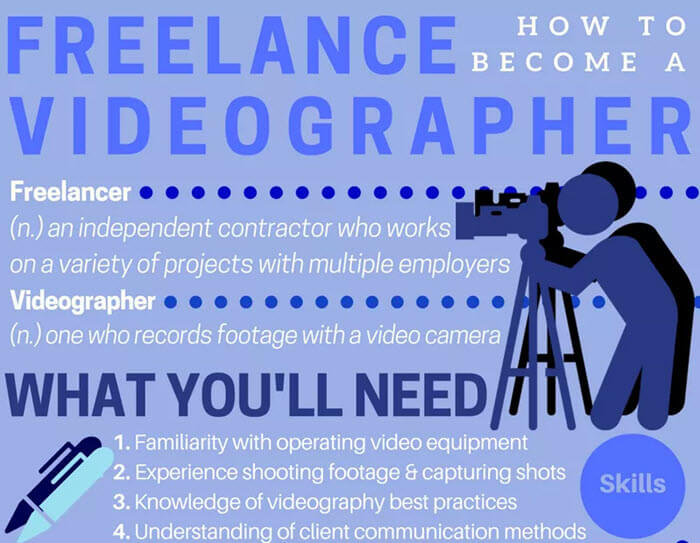The video production space is a fun industry. You get to meet, experience and network with different people, create unique work, use cool equipment, and be in control of the product you’re creating; seeing it come to fruition.
Combine that with video production’s flashy aura; it’s a very appealing career path. But it’s not always the easiest to land your first video production job. Because of the enticing industry, there are hordes of people looking for careers at video production companies.
I get about 50 emails a month from recent graduates and job seekers of all ages, looking to call our video production company home. From all of these interactions, and hiring for a variety of video production positions, I thought it would be helpful to put together:
10 Tips to Get a Job With a Video Production Company
1. Audit Your Current Situation
Are you a film student? Or a recent film school graduate?
The first step is understanding what your skill set is and where you are currently in your career path. It’s time to ask yourself some questions…
What are you good at? What skills do you possess? The key here is seeking objective third party feedback to get a firm grasp on your actual skill set.
The biggest problem I see when people seek jobs in video production is they approach an employer thinking they are good at editing (or shooting, etc.) when in reality their skills aren’t up to par.
Become self-aware and seek an appropriate position that fits your talent and skill.
For example, let’s say you want to be a video editor. Here’s what you need to do:
- Sit down and take out a sheet of paper.
- Search Google and write down a list of all the video production companies you’d like to contact and work for.
- Create a list of 50 or more.
- Take a look at their work and order them in the level of quality. The one at the bottom is the lowest level of editing quality, and the one at the top is the highest quality level.
- Once in order, take your best work and match it to the level of quality you think you fall. You might be near the top around #1, or you might be near the bottom around #45 or so.
- Ask a variety of unbiased sources to help you discover where you fall overall in the top 50.
You will not improve yourself or get matched with the right job if you have an unrealistic view of your skill set. Once you have this, you can begin your search for your ideal situation.
2. Create Video Content for the Job You Want
You have to create videos that are relevant to the company you want to hire you.
If you want to work for a company that primarily creates 30-second videos and commercials, you should make a variety of 30-second marketing videos and commercials.
If you want to work for a company that makes animation videos, you should make animation videos.
For beginners, this means creating free videos for companies just to get noticed. Go out and have fun creating videos until it matches the quality and skill of the company you want to work with.
This is the most challenging part of the job pursuit, but it’s the most fun and most essential part. For some, it may take just one video, or it could involve making 5, 10, 20 videos. But the key takeaway is to have video examples that match the quality needed to land a job at the video production company you desire.
After each video you make, examine the video side by side with an example of a company you are looking to work for.
3. Market Yourself on Social Platforms

image credit: Jason Howie, Social Media (CC BY 2.0)
Now that you have an honest review of yourself and you have work that is relevant and ready to be shown to employers, it’s time to package yourself.
You need to look at yourself as the business, and all the video production companies as your potential clients. Your work is the product, and you are the salesperson. What you do next is going to make or break you.
Contact your list with a pitch that they should hire you.
Here’s a step-by-step checklist to create momentum in your job search:
Step 1: Have a presence on all social media networks (Facebook, Twitter, LinkedIn, Vimeo, YouTube, Instagram, etc.)
Step 2: Have clean, professional photos that display who you are and what you look like (make it fun and creative)
Step 3: Fill out bios that describe who you are, where you live, and tell your story (get creative here as well)
Step 4: Upload all your video work to Vimeo and YouTube
Step 5: Fill out the descriptions of all your videos to describe your role and the background on the work
Step 6: Add custom thumbnails to all the videos to look as presentable as possible
Step 7: Put the work into playlists and collections based on what type of work it is or what role you played in it
Step 8: Create a simple website using Squarespace or another website builder (if you are also a web developer, this is your time to shine and make something very slick)
Step 9: Make it simple, clean and focused on the work
Step 10: Have your best main video or demo reel displayed on the front page
Step 11: Add your contact information, including cell phone number, email, and social media accounts
Step 12: Create an email account, adding a professional signature with your name, contact information, title, and social media accounts
Step 13: Create a resume that quickly displays your relevant experience (not that important, but some will request it)
Step 14: Build a list of as many video production companies as possible, including the name’s of the hiring manager (usually the owner), the email address of the hiring manager, the mailing address, their website, and some notes about them. You can find most of the information through Google search.
Step 15: Make the list as big as you can.
4. Email Owner’s/Hiring Manager’s of Video Production Company’s
You’ll need a few items in place for your emails.
- You’ll need videos that match the quality level of where you want to work
- You should have a website and social presence that displays the videos
- You should have an email account and a list of companies you want to work for.
Assuming you cannot find a job ad or position that you can apply for, you’re going to have to reach out to them. Market yourself as a great candidate they need to hire. Keep the email short, and focused on your work.
Here’s a great example…
Subject: Joining your team
Body: Hi [insert first name of hiring manager / owner],
My name is [insert your name] and I’m a [insert your production expertise] living here in [insert your location]. I’m emailing you because I believe the type of work I do would add a ton of value to your team. Take a look: [insert link to site here]
I’m a fast learner, work quickly, and I can work with little or no direction. My production skills and my character would make me a valuable and profitable part of your team.
What do you think? Could I stop in sometime to chat about the possibility of working together?
The key to the email is that it’s short, it tells them who you are and why you are emailing them. It directs the owner or manager to your work, touches on some of your character skills, and gives a simple request and call to action.
Take this email, and send it out to every company on your list. You can use the above email as a starter and tweak for every company. Try to find a common bond between you and the owner.
Research their Facebook or LinkedIn profiles.
Where did they go to school? What do they like? Discover ways to connect with them and blend the information into the emails.
Once you have emailed everyone, start to make phone calls with a similar message as to what’s in the email. Leave them a voicemail or engage them in a phone call.
Aim to network and create relationships with the owners of all the companies on your list. The point of this step is to make the companies aware of you and get in front of them.
5. Listen to Feedback, Improve, Follow Up
Once you have created and initiated conversation with some production companies, it’s time to listen, improve, and follow up.
It’s critical that you listen to the feedback they give you.
Questions you can ask…
- Ask them what they think of your work.
- Ask if they would hire you if a position opened in the future.
- Ask how to best stay in touch with them?
Create a list of all the companies and follow up with them every month or so. Email them new work you created and show them areas where you have improved. Keep creating videos and enhance your skills.
The goal is to get an offer. Persistence will pay off.
If you do this consistently for a year, you should be able to land a job. If you do not, don’t get discouraged. A lot of this process depends on luck. You often need to be in the right place at the right time. The more follow up work, creating new videos and networking you do will pay off in the end.
Remember, not everyone is made out to be a hands-on creative in video production, but maybe you might be a producer, or an office manager, or a production assistant.
Part 2 – Try another angle
6. Apply for Internship Programs
There is an option to seek internship programs. This helps in a variety of ways. Internship programs are generally an exchange for services – you work for the company; you get real-world experience.
The life experience, skill set and the connections you make will be invaluable. There are paid internships as well but may be harder to land.
7. Become a Freelance Videographer
A freelance videographer works as an independent contractor on multiple projects.
What you’ll need:
- skillset
- equipment
- where to find gigs
- what to charge
Valoso, a digital media company, created the Ultimate Guide to Becoming a Freelance Videographer Infographic.

The full version is here.
They discuss equipment needs, what you can expect to do and salary.
Another good starting point is the Learner site for anyone looking for specific techniques in editing, lighting shooting, etc.
8. Network on a Daily Basis
As a freelance videographer (and even when you do land a job), the benefits of networking are critical for your business. It is all about building relationships and personal development. Your people skills are as essential as your technical/creative skills.
Every person you meet is an opportunity to find work. You are not just gaining exposure to them; you will be gaining exposure to their circle of connections as well.
Most jobs are found through referrals. As you become more established, your business will expand. One of your most significant assets in the industry will be a portfolio of your latest achievements.
Keep your website fresh with examples of your work and update often. Your goal eventually will be to create a sleek, custom site over time. Now you’ll have a “home” to send potential clients as you network.
9. Have a Go-getter/Positive Attitude
Understanding the industry is essential. But having a great attitude will take you the extra mile.
In this industry, you need to go with the flow. Say “yes” to as many opportunities as you can. Each will develop your skill set.
Having a positive attitude is often cited as a major reason for individual success and overall business health. The benefits of having a positive attitude are nearly infinite – in fact, no one ever says having a positive attitude causes problems. Think about it – when have you ever thought, “that person’s positive attitude is getting on my nerves?” [source]
10. Find and Follow Mentors

image credit: AiClassEland at English Wikibooks [CC BY-SA 2.5], via Wikimedia Commons
From Media Bistro, Advice from the pros- Real-world insights: – How I Turned a Passion for Video Into a Burgeoning Career,
“What tips do you have for those seeking mentorships?
Look at those people who are great at what they do, and who you idolize. Study and learn everything you can from them. Reach out to them. Once you have them as mentors, they will be fountains of knowledge you can tap when you need them. Just don’t get too annoying about it.”






Thanks for sharing this useful information.
No problem, Adam.
Appreciate you reading!